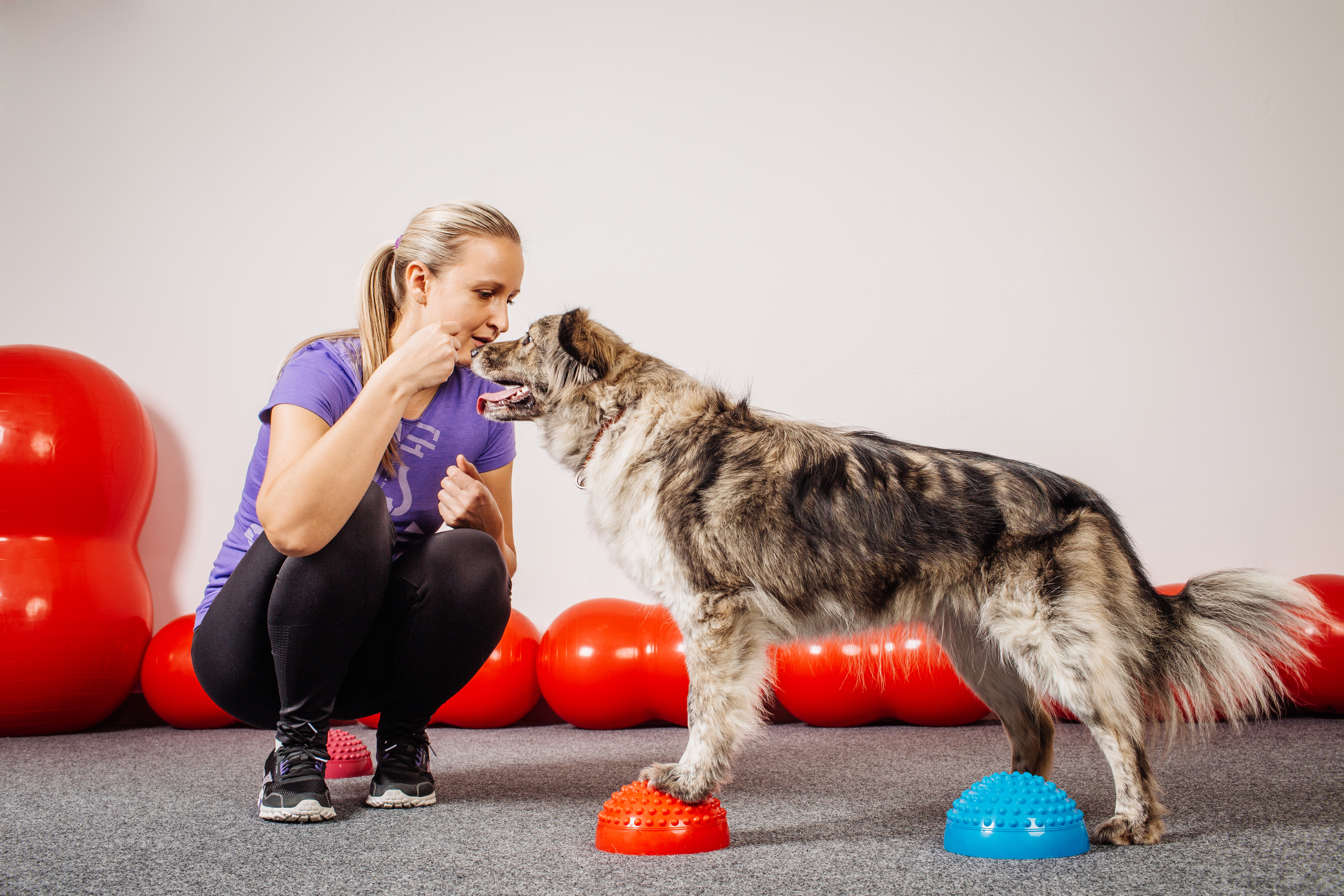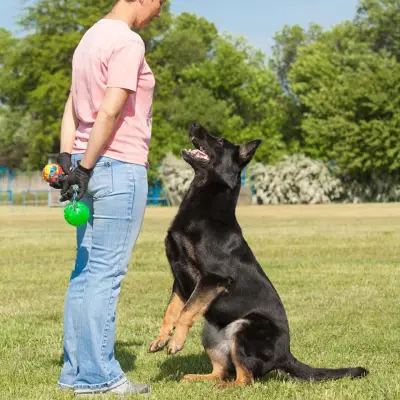Are you considering a career in dog training or looking for a fulfilling side hustle? Imagine a career where every day brings the joy of working with dogs, the satisfaction of teaching them new skills, and the pleasure of helping their owners understand them better.
Whether you're a dog lover, seeking a career change, or just looking for an enriching way to spend your time, a career in dog training offers endless rewards and opportunities for personal and professional growth.
Jump to:
What Does a Dog Trainer Do?
As a dog trainer, you have a unique and rewarding role. Your job is to teach dogs how to behave appropriately and help their owners understand and manage their pets better. Dog trainers typically teach dogs a variety of skills and behaviours, including:
- Basic Obedience Commands: Such as sit, stay, come, down, and heel.
- Leash Training: Teaching dogs to walk calmly on a lead without pulling.
- Socialisation: Helping dogs interact safely and comfortably with other animals and people.
- House Training: Including toilet training and establishing routines for eating and sleeping.
- Crate Training: Teaching dogs to be calm and secure when in their crate.
- Behavioural Modification: Addressing behavioural issues like barking, chewing, or jumping.
- Agility Training: For dogs involved in agility sports, teaching them to navigate obstacles and courses.
- Trick Training: Teaching fun tricks like roll over, play dead, or fetch.
- Boundary Training: Teaching dogs to stay within certain areas, like their garden or specific rooms in the house.
- Clicker Training: Using a clicker as a positive reinforcement tool to shape behaviour.
- Recall Training: Ensuring dogs return when called, particularly in outdoor or off-lead scenarios.

The First Steps: Qualifications and Experience
Your career in dog training begins with the right qualifications and training. While there's no one-size-fits-all path, gaining a solid foundation in dog behaviour and training techniques is essential.
What Qualifications Do You Need to be a Dog Trainer?
You don't necessarily need formal qualifications to become a professional dog trainer, but they can certainly help. Accredited animal care courses and certifications provide essential knowledge and credibility. These courses cover various topics, including canine communication, training methods, and handling skills.
What Experience do you Need to be a Dog Trainer?
Experience is an important aspect of becoming a dog trainer. Volunteering at animal shelters, working with experienced trainers, and attending workshops can provide invaluable hands-on experience. This real-world training allows you to apply what you've learned and understand canine behaviour in different contexts.
Training as a Dog Trainer – Accredited Dog Training Courses
Enrolling in accredited dog training courses is a fantastic way to begin your journey. These professional dog training courses, available both online and in-person, offer comprehensive training. You'll learn various techniques and methods to handle different dog behaviours effectively.
Centre of Excellence offers an array of accredited Animal Care courses, including our Dog Training Diploma Course and Canine Behaviour Training Course, that equip you with the qualifications and knowledge needed to excel in this field.

Jobs in the Dog Training Industry
The dog training industry offers a range of career opportunities. You could work for a dog training school, become a private trainer, or work with animal shelters. Each role has its own set of challenges and rewards, making this a versatile and exciting career choice.
Specialising in Your Career
As you gain experience, consider specialising in a specific area of dog training. Here are some roles you can specialise in:
- Obedience Training Specialist: Teaching basic to advanced obedience commands.
- Agility Training Instructor: Training dogs for agility sports and competitions.
- Service Dog Trainer: Training dogs for service roles, such as guide dogs or therapy dogs.
- Puppy Training Expert: Concentrating on training puppies, focusing on early socialisation and basic commands.
- Behaviour Modification Specialist: Addressing and modifying challenging behaviours like aggression, stress, anxiety, or excessive barking.
- Search and Rescue Dog Trainer: Training dogs for search and rescue operations.
- Canine Sports Trainer: Specialising in dog sports like flyball, disc dog, or dock jumping.
- Assistance Dog Trainer: Training dogs to assist people with disabilities.
- Therapy Dog Trainer: Preparing dogs to provide comfort and support in therapeutic settings.
- Working Dog Trainer: Training dogs for specific jobs, like herding, guarding, or police work.
Can you Make a Living as a Dog Trainer?
You can make a successful living as a dog trainer. Many people are willing to invest in dog training, making it a viable career option.
How Much Does a Dog Trainer Earn in the UK?
In the UK, the salary of a dog trainer can vary based on factors such as location, experience, specialisation, and whether they are self-employed or working for an organisation. The salary range for dog trainers in the UK is generally as follows:
- Entry-Level Dog Trainers: Starting salaries for those new to the field typically range from £15,000 to £20,000 per year.
- Experienced Dog Trainers: With several years of experience, dog trainers can expect to earn between £20,000 and £30,000 annually.
- Highly Experienced or Specialised Trainers: Those with a high level of expertise, specialisation in certain types of training, or who run their own successful business can earn upwards of £30,000, with some even exceeding £40,000 per year.
These figures can fluctuate, and self-employed dog trainers may earn more or less depending on the success and scale of their business and the rates they charge their clients.

Is it Hard Being a Dog Trainer?
Being a dog trainer can be challenging, but it’s also incredibly rewarding. It requires patience, consistency, and a deep understanding of canine behaviour. The joy of helping dogs and their owners live together harmoniously makes these challenges worth it.
How to Start a Dog Training Business in the UK
Starting a dog training business in the UK can be a fulfilling and profitable venture, but it requires careful planning and strategic execution. Here are the key steps to consider:
- Develop a Business Plan: Outline your business goals, target market, services offered, pricing strategy, and financial projections. Determine whether you'll be a sole trader, a partnership, or a limited company, as each has different legal and tax implications.
- Understand the Market: Research the demand for dog training services in your area. Identify your target audience, whether it's pet owners, working dog handlers, or specific dog breeds. Understand your competition and think about what sets your services apart.
- Gain the Necessary Qualifications: While there are no mandatory qualifications to become a dog trainer in the UK, having certifications from recognised bodies can enhance your credibility. Consider completing accredited animal training courses or obtaining a formal qualification in animal behaviour.
- Our Canine Business Diploma Course is developed specifically for those planning to run their own dog-focused business, and it is a fantastic place to start.
- Register Your Business: Depending on your business structure, you may need to register with HM Revenue & Customs. You'll also need to register with Companies House to form a limited company.
- Get Insured: Obtain the necessary insurance, including public liability insurance, to protect yourself and your business against potential legal claims.
- Decide on Your Services: Offer a range of services such as puppy training, obedience classes, behaviour modification, or specialised training like agility or service dog training. Consider offering both group classes and one-to-one sessions.
- Set Up Your Training Space: Decide whether you'll rent a space, use clients' homes, or find a suitable outdoor area. Ensure the location is safe and conducive to effective training.
- Invest in Equipment: Purchase necessary training aids, such as leashes, clickers, treats, agility equipment, and training manuals.
- Marketing Your Business: Develop a marketing strategy to attract clients. This could include creating a website, using social media, networking with local veterinarians and pet shops, distributing flyers, or offering introductory discounts.
- Networking and Collaboration: Connect with other dog professionals, such as veterinarians, pet store owners, and dog groomers. These relationships can lead to referrals and collaborative opportunities.
- Offer Excellent Customer Service: Build a strong reputation by providing high-quality, reliable services. Encourage word-of-mouth referrals by exceeding client expectations.
- Continuous Learning: Stay updated with the latest dog training methods and industry trends. Attend workshops, seminars, and conferences to enhance your skills and knowledge.
- Legal Considerations: Ensure compliance with relevant laws and regulations, including animal welfare and business regulations.
- Financial Management: Keep track of your income and expenses. Consider using accounting software or hiring an accountant to help manage your finances.
- Evaluate and Adapt: Regularly review your business performance and adapt your strategies as necessary. Be open to client feedback and be willing to make changes to improve your services.
Recommended for you!
Best SellersKickstart Your Dog Training Journey with Centre of Excellence
Ready to begin your journey as a dog trainer? Our Dog Training Diploma Course and Canine Behaviour Training Diploma Course offer an immersive dive into professional dog training, equipping you with knowledge and skills.
What Will You Gain?
- Comprehensive Knowledge: These courses extensively cover all aspects of dog training and behaviour. From basic obedience to advanced behavioural modification techniques, you’ll gain a deep and thorough understanding of what it takes to train and work with dogs effectively.
- Practical Skills: Your theoretical insights will give you the confidence and knowledge to put your learning into practice, ensuring you’re well-prepared for the challenges and rewards of working with various dog breeds and temperaments.
- Career Empowerment: Our course is tailored to empower you in your career as a dog trainer. Whether you aspire to work in a dog training facility, start your own dog training business, or specialise in certain areas, this course lays the foundation for a dynamic and fulfilling career path.
Special Offer
In our commitment to making quality education accessible, we’re thrilled to offer the Dog Training Diploma Course and Canine Behaviour Training Diploma Course at a special discounted rate of just £29, saving you over £100!













